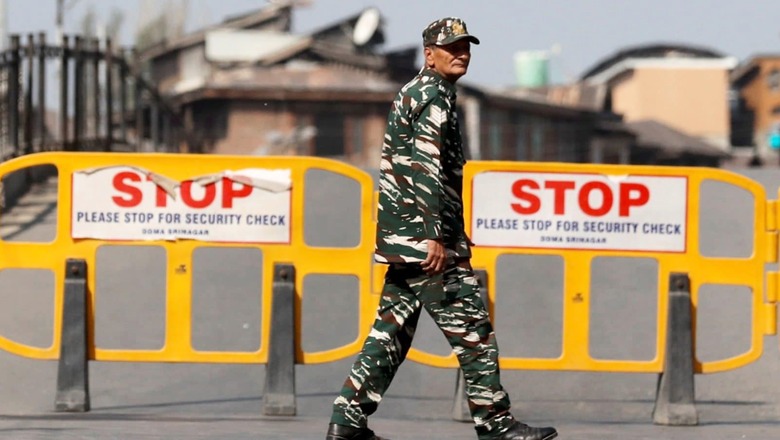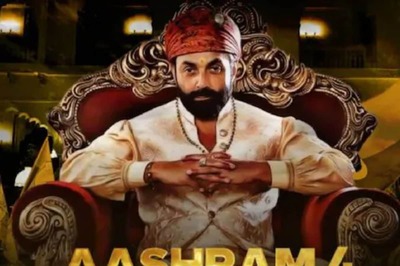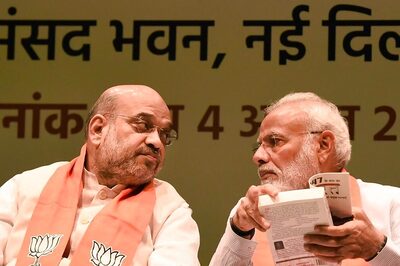
views
I had an opportunity to watch an interview of Mr A S Dulat, the former R&AW chief, with Karan Thapar on a YouTube channel. While Mr Dulat subtly appreciated that peace is holding up in Kashmir after the abrogation of article 370 on August 5, 2019, he still seems to be in denial that a lot of water has flown down the Jhelum. He is struggling to find peace within himself in the new realities dotting the Kashmiri landscape and the ideas that he has held dear but are irrelevant, tested, failed and dusted. His idea of managing the problem in Kashmir with ad hoc measures through the people who are perceived as agents and proxies of New Delhi has not led us to a solution to terrorism in the valley.
The policy audit, evaluation and shift by New Delhi post-2019, to exterminate and uproot the systemic conditions sustaining terrorism is still in its infancy to draw sweeping conclusions. If something hasn’t worked for 75 years and is being discarded for a new thinking and new policy of finding a solution, it needs to be given the time it deserves to be evaluated and hence for judgment to be passed. There are however strong indications that the new policy in Kashmir is working and the optimism is not misplaced that it shall bring lasting peace to end decades-long bloodshed. The contesting narratives of the permanent solution versus temporary management of frequent relapses of trouble warrant better understanding.
Also Read: Opinion | Is Yasin Malik a Friend or Foe of Kashmir?
The one constant that is colligated with the terrorism problem in Kashmir from its embryonic days to date is Pakistan. Pakistan doesn’t operate in Kashmir with its military but with a system and constituency that it built over the decades. The growing influence of radical Jamat-e-Islami that Mr Dulat also talks about has not sprung up overnight. It evolved over the decades with implicit and explicit support of powers which even Mr Dulat admits. This has been our policy failure in Kashmir. We have allowed Kashmiris to be poisoned by the toxic Jamat-e-Islami ideology and yet are not doing anything about it. The growth of Jamat-e-Islami not only in the social milieu of Kashmir but in the government system under the watch and ward of the Abdullahs and Muftis, the favourites of Dulat, is the greatest disservice done to the country and the people of Jammu and Kashmir. The role of Congress in supporting this radical outfit to counter the influence of the competitor regional parties in the 1970s-80s is public knowledge in Kashmir.
Expunging such militant ideology from the collective cognition and conscience of a substantial constituency of the Kashmiri population impacted by it, cannot be done overnight as I mentioned earlier. It didn’t grow overnight. There undoubtedly is a result-oriented strategy in vogue by the government to undo the infiltration of radical elements in the government set up and also eliminate the influence of undesired radical ideology in social institutions. Tangible and concrete measures have been taken which are having an impact on the ground. That is for everybody to see. The great favour the country would do to our Kashmiri mothers and fathers is to save their sons from becoming expendables of the Jihad factory of Jamat-e-Islami.
The endeavour of the central government in this direction needs to be acknowledged and appreciated. The Jamat-e-Islami worldview is not only seen as a problem in India but all over the Muslim world like in Bangladesh and in the Arab world where its ideological twin Muslim Brotherhood is posing a similar challenge to the social fabric.
While the hardware sustaining terrorism wherein gun-toting terrorists consist of a critical mass has received a decisive blow with a marked reduction in numbers compared to what used the be a 2016-17 figure, the more important is the success that security grid achieved in dismantling the organised structures of terrorist tanzeems. The command structure and an organised propaganda machinery and platform associated with outfits like Hizbul Mujahideen, Lashkar-e-Taiba, and Jaish-e-Mohammad is a thing of past. They have been de-capacitated and dismantled to the point of no return. The remnants like lone wolves and small terrorist gangs devoid of any structured existence are being dealt with effectively and shall eventually cease to exist bringing complete normalcy. The challenge remains the ideological and logistic framework sustaining and nurturing terrorism rather than minions carrying small arms creating some ruffles. Saving human lives nonetheless remains a priority.
The security policy in place is working and completely dismantling the ideological and physical infrastructure of terrorism and will take some time though not as much time as 75 years wasted in managing the problem that actually needed to be solved once and for all. The recent killings need to be seen in perspective. The policy of zero tolerance to terrorism and defective onslaught against the ecosystem has frustrated the terrorist masters sitting across and they target innocent people in an attempt to break our resolve. Should we succumb to these pressures and switch back to the old system that tolerated and accepted the inhuman existence of terrorism as a reality in Kashmir society? The answer obviously is a no.
Also Read: The Strange New Allies of Kashmiri Pandits: Duplicitous, Opportunistic Wolves in Sheep’s Clothing
While the security grid is doing its best to protect vulnerable citizens from falling prey to terror, the challenges are bigger than we had in the past. As we are out to fight to the finish, our adversary is also making a last-ditch effort to undo what we have achieved and are determined for. At this critical juncture of our decisive battle in our national interest, we all need to stand guard and not get swayed by inimical voices and naysayers who want the old system back which stands tried and proven an abject failure. A lot of blood has been spilled in Kashmir, a lot of innocent citizens have fallen to terror guns, and a lot of our brave men in the army and the police have laid down their lives and we have absolutely no choice but to fight to the finish.
The country and its people need to understand what is at stake. The war against Pakistan and its allies in Kashmir is not an ordinary war. The outcome of this war will determine where we are leading our country to. And that outcome will undoubtedly be nothing but victory for our country. To safeguard values that we hold dear, the people of Jammu and Kashmir who belong to blood and soil of India, the land where our sufis, acharyas, and sanats have been worshipping for centuries, we need to win this battle against evil.
Raja Muneeb is a Columnist from Srinagar. His Twitter handle is @rajamuneeb. The views expressed in this article are those of the author and do not represent the stand of this publication.
Read all the Latest Opinions here




















Comments
0 comment